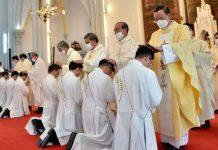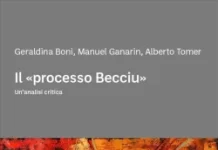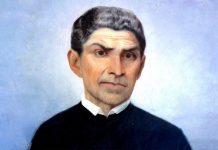From creatures, he makes us sons, and from sinners, saints. At the moment of Baptism, we are born for God, and this life has no end. Learn more about this sacrament, the beginning and basis of Christian life.
Newsroom (31/12/2021 08:58, Gaudium Press) Birth… this is a fact that will be present in the lives of all men, from Adam and Eve until the end of the world.
And although it is so common and widespread, who does not celebrate the day of his birth with great joy? Who forgets this day on which he opened his eyes to the world?
Now, just as man is born into this world, so must he be born to God. And this birth takes place through the first of the sacraments, which every Catholic has already received, but which, not infrequently, is not as highly valued as it should be.
So, let’s know5 topics every Catholic needs to know about Baptism.
First of all, why do we call it Baptism?
Thus states the Catechism of the Catholic Church: “It is called Baptism because of the central rite with which it is performed: to baptize (baptize in Greek) means ‘to immerse’, ‘to immerse’. The ‘immersion’ in water symbolizes the burial of the catechumen in Christ’s death, from which he comes out by resurrection with Him as a ‘new creature’ (2 Cor 5:17; Gal 6:15).”[1]
Why is it the first of the sacraments?
“Holy Baptism is the foundation of the whole Christian life, the door of life in the Spirit (“vitae spiritualis ianua – door of spiritual life”) and the door that gives access to the other sacraments. Through Baptism we are freed from sin and regenerated as children of God: we become members of Christ and are incorporated into the Church and made sharers in her mission.”[2]
Who can receive it?
“Every human being not yet baptized – and he alone – is capable of receiving Baptism.”[3]
And who can minister it? How?
The ordinary ministers of baptism are the bishop and the priest, and in the Latin Church also the deacon.
In case of need, any person, even if not baptized, as long as he has the required intention, can baptize using the Trinitarian baptismal formula. The required intention is that of wanting to do what the Church does when she baptizes. The Church sees the reason for this possibility in the universal salvific will of God and the necessity of Baptism for salvation.”[4] The formula is: I baptize you in the name of the Father and of the Son and of the Holy Spirit. It is also necessary that water be poured over the head of the one being baptized.[5]
What is a Godparent?
Being a godparent consists of “striving to ensure that the baptized person lives a Christian life in accordance with Baptism and faithfully fulfills the obligations that go with it.”[6]
These are the requirements for someone to assume the office of godparent:
1. to be designated by the baptized person himself, or by the parents, or those who stand in their stead, or, in their absence, by the pastor or minister, and possess the aptitude and intention to carry out this office;
2. he/she has reached the age of sixteen years, unless another age has been determined by the diocesan bishop, or unless the pastor or minister, for good reason, should admit an exception;
3. he/she is a confirmed Catholic, and has already received the Holy Eucharist, and leads a life consonant with the faith and the office he is about to fulfill;
4. he/she is not under any canonical penalty legitimately applied or declared;
5. he/she is not the father or mother of the baptized.
In summary, these are the basic notions regarding the rite of Baptism.
The Effects of Baptism
First of all, in Baptism we receive the Sanctifying Grace, by which we go from being mere creatures to being children of God. We also receive the theological virtues and the other infused virtues and gifts of the Holy Spirit.
Moreover, it imprints in the soul the baptismal character, which is an indelible spiritual mark, which is why baptism cannot be repeated. This character brings about a resemblance to Our Lord, and thus we are incorporated into His Mystical Body, which is the Church, and we possess participation in His priesthood, both to do apostolate and to have the capacity to receive the other sacraments.
Finally, Baptism produces the remission of all sins and their penalties, so that our soul is entirely cleansed of the faults committed up to this moment.
Once baptized, we enter into life. And this is only the beginning.
From this moment on, like every child, we need to grow and become stronger, but this will be the role of the other sacraments, which will continue to help us in this new life.
By Thiago Resende
[1] CCC 1214.
[2] CCC 1213.
[3] CCC 1246.
[4] CCC 1256.
[5] CCC 1284.
[6] CCL 872.

































